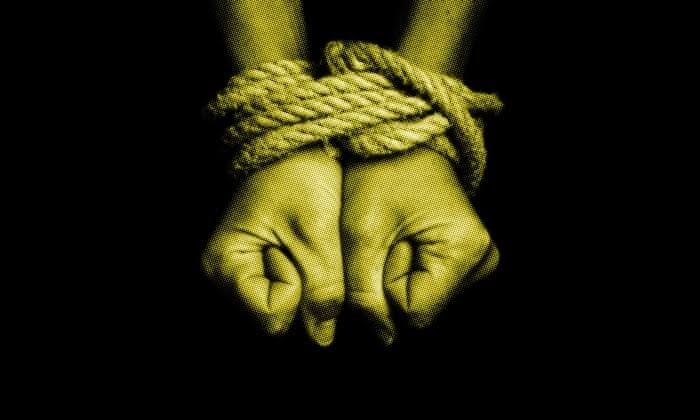Security group gives dirty details of how millions of naira exchanged hands in a terrible abduction triangle that has allegedly put Nigeria as a high-risk countries for an expatriate to work
Despite security measures put in place by the Federal Government, GIFT HABIB, with data from Nigeria Security Report by Beacon Inte, writes that 792 abductions were recorded from January to March this year.
Globally, Nigeria has been regarded as one of the high-risk countries for an expatriate to work due to the spate of kidnapping incidents.
The practice of kidnapping, banditry or abduction has continued to evolve among the bandits and terrorists of northern Nigeria, militants in the Niger Delta as well as the ritual killers of the western and eastern parts of the country.
Nigeria’s kidnapping crisis is a complicated situation with a number of interests, motives, and actors. Militants, terrorists and insurgents use it to raise funds for their operations and as a bargaining strategy.
This criminal activity is in three categories, which are trending in society. One such category; friends and families kidnap themselves for immediate financial rewards. Another category involves attacking buses on the road and taking all the passengers, assaulting villages and taking helpless victims hostage, and attacking communities.
READ ALSO:
Cancer Scare: NAFDAC Extends Investigation To Other Brands Of Noodles
Adamawa: Police Arrest Suspended REC Yunusa-Ari
BREAKING: Buhari Excludes Finance Ministry From TSA
Popular Transporter, Abel Omoruyi, Is Dead
Lastly, this category involves sophisticated organised crime and large-scale business involving multiple actors, often targeting high-value individuals and designed to draw the government’s attention.
On a daily basis, incidences of kidnapping all around the country are reported. The pattern is that after a few days of the occurrence of kidnap, a demand for ransom follows. Victims of these scourges cut across all segments of society; students, children, women, men, and expatriates.
In 2014, this scourge took a whole new dimension, when over 300 female students were kidnapped from the Government Girls Secondary School, Chibok, Borno State by the dreaded Islamic sect Boko Haram. Fast forward to 2021, kidnapping for ransom has not only risen but has also spread to all regions of the country.
Kidnapping for ransom thrives in Nigeria because the material incentive and opportunity are there, and victims find it expedient to pay a ransom. Bandits, armed groups of Fulani herders, and jihadists use forests in different parts of Nigeria as strongholds from which to raid and as safe havens to hold hostages who are released for ransom.
The January 2021 edition of Constellis’ Kidnap for Ransom Insight Report indicated that Nigeria and Libya account for over 70 per cent of cases of kidnapping in Africa.
According to the report, between November and December 2020, Nigeria ranked second in the world behind the USA for the kidnapping of foreign citizens living in the country.
About N653.7 million was paid as ransom in Nigeria between July 2021 and June 2022, a period of one year, for the release of kidnap victims, a report by a Lagos-based security and political risk research firm showed.
The report, ‘The Economics of Nigeria’s Kidnap Industry’, conducted by SBM Intelligence, detailed the country’s security issues, including incidents of banditry and the costs associated with kidnapping for ransom.
The report said at least 500 incidents of kidnapping were recorded, and 3,420 people were abducted across Nigeria, with 564 others killed in violence associated with abductions in the one-year period.
The security report also recorded that N6.531bn ($9.9) was demanded in ransom in the year, but N653.7m ($1.2 million) was paid as ransom for the release of captives.
In 2022, according to data sourced from the Council on Foreign Relations and National Security Tracker, 4,545 people were killed by non-state actors, while 4,611 others were kidnapped.
In 2023, over 700 abductions were carried out across the country in its first quarter despite the fact that the period was the peak of electioneering and when the presidential election took place.
According to a 2023 Nigeria Security Report by Beacon Intel, a total of 792 abductions were recorded between January – March 2023.
According to the geopolitical regions, a breakdown of these abductions showed that the North Central suffered the highest with 325 incidents, followed by the North West, 250; South East, 74; North East, 58; South-South, 56; and South West, 29.
In the monitored period, Niger state recorded the highest abductions at 238. This was followed by Kaduna, 113; and Katsina, 86.
Others include Borno State, 47; Zamfara, 40; Edo, 37; Federal Capital Territory, 34; and Imo, 32. Outside of the Northern Region, Imo state recorded the highest for the South East at 32, Edo the highest for the South South at 37, and Osun the highest for the South West with 13 incidents.
The breakdown further showed that 41.0% of the Quarter 1 abduction figures affected the North Central region, 31.6% affected the North West, and 7.3% affected the North East. This puts the total percentage of kidnappings in Northern Nigeria for January – March 2023 at 79.9%.
There was a 42.62% increase in the incidents of abductions in the Southeast region.
Analysing the abduction incidents in the first quarter of 2022 and 2023, the document revealed that there was a 56.2% decrease in total abductions across the country.
According to geopolitical zones, the North Central recorded a 29.9% decrease, the North West a 76.5% decrease, the North East a 50.4% decrease, then the South-South had a 22.2% increase, the South West a 35.6% decrease, the South East a 54.2% increase. This puts the total percentage of abductions in northern Nigeria as of 2022 at 90.9% and 2023 at 79.9%, signifying an 11% decrease.
According to the data, kidnapping through raid recorded 533 incidents; unknown, 103; combat, five; Ambush, 91 and individual attack, 55 incidents.
On January 7, gunmen attacked the Tom Ikimi railway station in Igueben, in the Igueben Local Government Area of Edo state in the south of the country, kidnapping at least 31 passengers waiting to board. The captors fired into the air before taking the passengers away, leaving some with gunshot wounds. The Edo State Police Command stated that the kidnappers were herders armed with AK-47 rifles. The Edo state government later revealed that 6 of the 31 abducted people were rescued by a joint team of security agencies.
It was reported on January 20 that gunmen suspected to be bandits abducted pupils of LEA Primary School, Alwaza, in the Alwaza community in Nasarawa State.
During the financial squeeze, cases of banditry and kidnapping went down. But that changed since the Central Bank of Nigeria complied with the Supreme Court directive to release money into the system. Following the development, no fewer than 12 residents of Grow Homes Estate, along Kuchibiyi in the Kubwa area of Federal Capital Territory, were kidnapped by gunmen.
On April 8, 2023; Nigerians were again thrown into fear following the resurgence of kidnapping in parts of the country following the lifting of the ban on old naira notes. Bandits abducted over 80 children in the Tsafe Local Government Area of Zamfara State. The children between the ages of 12 and 17 were kidnapped.
However, the security agencies have made some arrests for these abductors. Only recently, the Lagos state police command said it arrested a couple over an alleged self-kidnap for N5 million ransom.
The Police Spokesperson, Benjamin Hundeyin, noted that the husband, 53, and wife, 48, were arrested after a family member of the man reported the purported kidnap. He said the couple, who admitted to the crime, said they planned the self-kidnap with the hope of raising N3 million to buy back their house in the Badagry area of Lagos.
In March 2023, the Ogun State police command said its operatives arrested two suspected kidnappers while two kidnapped victims were rescued from them.
Speaking with our correspondent on ways to reduce this rising trend, a security expert, Jackson Ojo, stated that arrested kidnapped or terrorists should be sentenced to life imprisonment to serve as a deterrent to others.
Ojo explained “Honestly, I know that the government of the day is overwhelmed, and I do not see reasons why any Nigerian should be expecting anything positive from this administration. I can not blame the corridor of security agencies and the paramilitaries, but I will blame it on the corridor of the government.
“During pre-election and election, there was no kidnapping, attacks, and killings in the North West, North Central and North East but immediately after the election, Nigerians saw what happened; a series of kidnappings in Kaduna, Zamfara, and Katsina.
“For me, the government has not done enough in tackling terrorism, kidnapping, and what have you. We hear the government say some kidnappers or terrorists have been arrested. But where are they? Why put them in prisons? Why not prosecute and convict them? They need to be sentenced to life imprisonment or death sentence, which would serve as a deterrent to others.”
Another security expert, Oladele Fajana, said security is everyone’s business, advising the government to invest more in the purchase of drones to help address the situation.
Fajana noted “Security is not only about the Police, military, and NSCDC, but it is all about everyone contributing to their own quota.
“The issue of insecurity has led to food scarcity, especially in the northern part of the country. Those involved in the production and distribution of these harvested foods have been kidnapped.
“However, I will be clamouring for drones, and that is the only alternative way kidnapping or abduction can be reduced in Nigeria. The Ogun State government has taken steps, and I heard that they have acquired drones that would monitor the Lagos-Ibadan expressway.
“I advise the government to go for drones so as to reduce the criminality of these non-state actors destroying the lives of Nigerians.”





